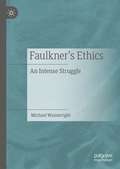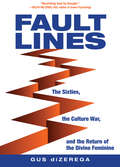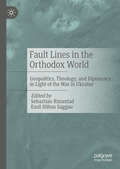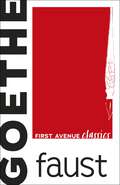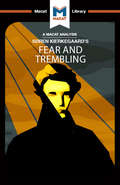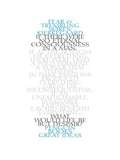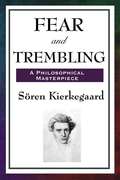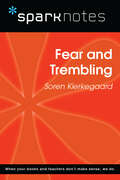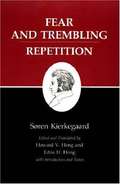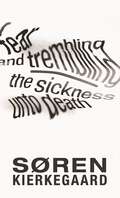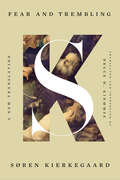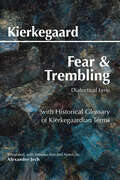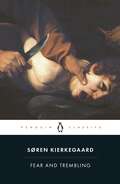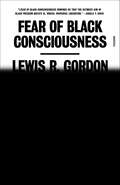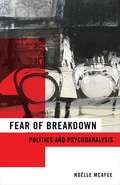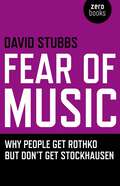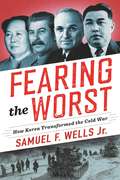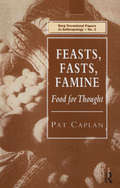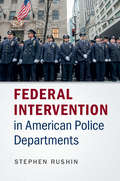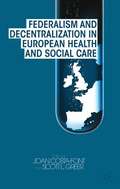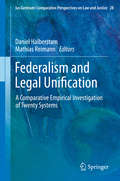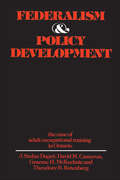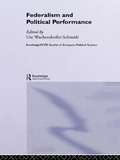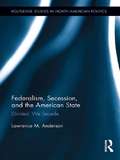- Table View
- List View
Faulkner’s Ethics: An Intense Struggle
by Michael WainwrightThis book offers the first comprehensive investigation of ethics in the canon of William Faulkner. As the fundamental framework for its analysis of Faulkner’s fiction, this study draws on The Methods of Ethics, the magnum opus of the utilitarian philosopher Henry Sidgwick. While Faulkner’s Ethics does not claim that Faulkner read Sidgwick’s work, this book traces Faulkner’s moral sensitivity. It argues that Faulkner’s language is a moral medium that captures the ways in which people negotiate the ethical demands that life places on them. Tracing the contours of this evolving medium across six of the author’s major novels, it explores the basic precepts set out in The Methods of Ethics with the application of more recent contributions to moral philosophy, especially those of Jacques Derrida and Derek Parfit.
Fault Lines
by Gus DizeregaThe United States is suffering its greatest upheaval since the Civil War-politically, economically, socially, religiously. With elegant, sweeping vision, Gus diZerega explores the complex causes leading us to this point, comparing them to giant fault lines that, when they erupt, create enormous disturbance and in time new landscapes. He traces the disruption, first, to America's first countercultural movement originating in the antebellum South and coming into later conflict with the "counterculture" of the 60s that continues now in phenomena like Burning Man; and second, to the crumbling of the moral foundation birthed by the Enlightenment, leading to today's nihilism. But within the loss resides hope: diZerega sees promise of a new society based more in equality, sacred feminine values, and spiritual immanence. Whether the prevailing oligarchy will abort this transformation is the question of our time. This book enables those of us now living through it to understand the powerful forces shaping our lives and calling on us for a response.
Fault Lines in the Orthodox World: Geopolitics, Theology, and Diplomacy in Light of the War in Ukraine
by Sebastian Rimestad Emil Hilton SaggauThroughout the past years, the Orthodox world has seen numerous political and theological confrontations. New borders have been shaped by churches and states. This only increased in light of the Russian-backed conflict in Ukraine from 2014 and onwards, which has led to new theological lines of thinking, geopolitical confrontations, and an acute need for diplomatic handling of crisis. At the centre is the Russian Orthodox Church’s global role and its effects in Ukraine. The confrontations are born out of a complex entanglement of church politics, theological differences, legal tensions, national allegiances, and the very concrete political and military clashes between nation states. In light of the war in Ukraine, Global Orthodoxy has seen new fault lines in the making. This volume gathers chapters that shed light on these entanglements and their political, theological, and geopolitical consequences. The book is not limited to the Russian-Ukrainian conflict, but also includes papers focusing on other nations, churches, and aspects (theological, theoretical, geopolitical, empirical etc.).
Faust: A Tragedy (First Avenue Classics ™)
by Johann Wolfgang GoetheFaust, a once-godly scholar, is beginning to suspect that his efforts to learn the secrets of the universe will never be successful. Desperate, frustrated, and suicidal, he makes a deal with Mephistopheles, an agent of the devil. Signed in blood, the contract states that Mephistopheles will obey Faust on Earth, but in return, Faust must serve him in Hell. Faust is unaware that the pact is part of a wager that God and Mephistopheles have made over the fate of his immortal soul. Mephistopheles gives Faust anything and everything he wants, but is it worth the pain and suffering it causes Faust's loved ones? This is an unabridged version of German author Johann Wolfgang von Goethe's tragic play, first published in 1808, and translated by American poet Bayard Taylor in 1870.
Fear and Trembling
by Brittany Pheiffer NobleDanish philosopher Søren Kierkegaard’s 1843 book Fear and Trembling shows precisely why he is regarded as one of the most significant and creative philosophers of the nineteenth century. Creative thinkers can be many things, but one of their common attributes is an ability to redefine, reframe and reconsider problems from novel angles. In Kierkegaard’s case, he chose to approach the problems of faith and ethics in a deliberately artful and non-systematic way. Writing under the pseudonym “John the Silent,” he declared that he was “nothing of a philosopher,” but an “amateur,” wanting to write poetically and elegantly about the things that fascinated him. While Fear and Trembling is very much the work of a philosopher, Kierkegaard’s protests showed his intent to take a different path, approaching his topic like no one else before him. The book goes on to ask what the real nature of our personal relationship with God might be, and how faith might interact with ethics. What, Kierkegaard asks, can we make of God asking Abraham to sacrifice his only son, and of Abraham obeying? Arguing the unorthodox position that in following God’s incomprehensible will Abraham had acted ethically, Kierkegaard set out the parameters of a moral argument that remains strikingly novel over a 150 years later.
Fear and Trembling
by Soren KierkegaardThe perfect books for the true book lover, Penguin's Great Ideas series features twelve more groundbreaking works by some of history's most prodigious thinkers. Each volume is beautifully packaged with a unique type-driven design that highlights the bookmaker's art. Offering great literature in great packages at great prices, this series is ideal for those readers who want to explore and savor the Great Ideas that have shaped our world. Regarded as the father of Existentialism, Kierkegaard transformed philosophy with his conviction that we must all create our own nature; in this great work of religious anxiety, he argues that a true understanding of God can only be attained by making a personal "leap of faith."
Fear and Trembling
by Soren KierkegaardIn our time nobody is content to stop with faith but wants to go further. It would perhaps be rash to ask where these people are going, but it is surely a sign of breeding and culture for me to assume that everybody has faith, for otherwise it would be queer for them to be . . . going further. In those old days it was different, then faith was a task for a whole lifetime, because it was assumed that dexterity in faith is not acquired in a few days or weeks. When the tried oldster drew near to his last hour, having fought the good fight and kept the faith, his heart was still young enough not to have forgotten that fear and trembling which chastened the youth, which the man indeed held in check, but which no man quite outgrows. . . except as he might succeed at the earliest opportunity in going further. Where these revered figures arrived, that is the point where everybody in our day begins to go further.
Fear and Trembling (SparkNotes Philosophy Guide)
by SparkNotesFear and Trembling (SparkNotes Philosophy Guide) Making the reading experience fun! SparkNotes Philosophy Guides are one-stop guides to the great works of philosophy–masterpieces that stand at the foundations of Western thought. Inside each Philosophy Guide you&’ll find insightful overviews of great philosophical works of the Western world.
Fear and Trembling / Repetition
by Howard V. Hong Edna H. Hong Søren KierkegaardFor Fear and Trembling, Kierkegaard used the pseudonym Johannes de Silentio, and for Repetition, he used Constantin Constantius. In Fear and Trembling, Kierkegaard explores the faith that transcends the ethical, while in Repetition, he discusses the most profound implications of the unity of personhood and of identity within change - the repetition that creates the rebirth of God in the heart of man, bringing the eternal into the present and allowing the past to retain its meaning.
Fear and Trembling and The Sickness Unto Death
by Søren KierkegaardWalter Lowrie's classic, bestselling translation of Søren Kierkegaard's most important and popular books remains unmatched for its readability and literary quality. Fear and Trembling and The Sickness Unto Death established Kierkegaard as the father of existentialism and have come to define his contribution to philosophy. Lowrie's translation, first published in 1941 and later revised, was the first in English, and it has introduced hundreds of thousands of readers to Kierkegaard's thought. Kierkegaard counted Fear and Trembling and The Sickness Unto Death among "the most perfect books I have written," and in them he introduces two terms--"the absurd" and "despair"--that have become key terms in modern thought. Fear and Trembling takes up the story of Abraham and Isaac to explore a faith that transcends the ethical, persists in the face of the absurd, and meets its reward in the return of all that the faithful one is willing to sacrifice, while The Sickness Unto Death examines the spiritual anxiety of despair. Walter Lowrie's magnificent translation of these seminal works continues to provide an ideal introduction to Kierkegaard. And, as Gordon Marino argues in a new introduction, these books are as relevant as ever in today's age of anxiety.
Fear and Trembling: A New Translation
by Søren KierkegaardThis newly translated Fear and Trembling, a foundational document of modern philosophy and existentialism, could not be more apt for our perilous times. First published in 1843 under the pseudonym Johannes de silentio (“John of Silence”), Soren Kierkegaard’s richly resonant Fear and Trembling has for generations stood as a pivotal text in the history of moral philosophy, inspiring such artistic and philosophical luminaries as Edvard Munch, W. H. Auden, Walter Benjamin, and existentialist Jean-Paul Sartre. Now, in our era of immense uncertainty, renowned Kierkegaard scholar Bruce H. Kirmmse eloquently brings this classic work to a new generation of readers. Retelling the biblical story of the binding of Isaac, Fear and Trembling expounds on the ordeal of Abraham, who was commanded by God to sacrifice his own son in an exceptional test of faith. Disgusted at the self-certainty of his own age, Kierkegaard investigates the paradox underlying Abraham’s decision to allow his duty to God to take precedence over his duties to his family. As Kierkegaard’s narrator explains, the story presents a difficulty that is not often considered—namely, that after the ordeal is over and Isaac has been spared at the last moment, Abraham is capable of receiving him again and living normally, even joyfully, for the rest of his days. Almost inexplicably, “Abraham had faith and did not doubt.” Deftly tracing the autobiographical threads that run throughout the work, Kirmmse initially, in his lucid and engaging introduction, demystifies Kierkegaard’s fictive narrator, Johannes de silentio, drawing parallels between Abraham’s willingness to sacrifice his son and the author’s personal “sacrifices.” Ultimately, however, Kirmmse reveals Fear and Trembling as a fiercely polemical volume, designed to provoke the reader into considering what is actually meant by the word “faith,” and whether those who consider themselves “true believers” actually are. With a vibrancy almost never before seen in English, and “a matchless grasp of the intricacies of Kierkegaard’s writing process” (Gordon Marino), Kirmmse here definitively demonstrates Kierkegaard’s enduring power to illuminate the terrible wonder of faith.
Fear and Trembling: Dialectical Lyric (Hackett Classics)
by Søren Kierkegaard"Faithful to the original Danish text and eminently readable, Jech's translation of Fear and Trembling admirably communicates the literary qualities of Kierkegaard's text, as well as his occasional fits of inspiration. Jech displays an unusual sensitivity not only to the literary/linguistic qualities of Kierkegaard&’s prose, but also to his (often realized) aspirations to philosophical precision. As presented by Jech, Kierkegaard is not simply a gifted writer and speculative theologian dabbling in philosophy, but a philosopher concerned to limn the optimal role of philosophical reflection, and to do so experimentally, especially with respect to matters of morality and faith. The translation is furthermore supplemented by very helpful explanatory notes that convey Kierkegaard&’s own erudition and the multiple influences upon his thinking. The Historical Glossary will become a valuable reference tool for students and scholars of Kierkegaard&’s writings. It is likely to play a welcome role in encouraging an improved understanding of what Kierkegaard means when he employs his idiosyncratic categories, allusions, and vocabulary." —Daniel Conway, Professor of Philosophy and Humanities, Texas A&M University
Fear and Trembling: Dialectical Lyric by Johannes De Silentio
by Soren KierkegaardKierkegaard's infamous and hugely influential philosophical work on faith, choice and sacrificeIn Fear and Trembling Kierkegaard, writing under the pseudonym Johannes de silentio, expounds his personal view of religion through the scene in Genesis in which Abraham prepares to kill his son at God's command. Kierkegaard believed Abraham's unreserved obedience to be the essential leap of faith needed to make a full commitment to his religion. The conviction shown in this polemic - that an individual can have an exceptional mission in life - informed all his later writings, and was also hugely influential for both Protestant theology and the existentialist movement.Translated with an Introduction by Alastair Hannay
Fear of Black Consciousness
by Lewis R. GordonLewis R. Gordon's Fear of Black Consciousness is a groundbreaking account of Black consciousness by a leading philosopherIn this original and penetrating work, Lewis R. Gordon, one of the leading scholars of Black existentialism and anti-Blackness, takes the reader on a journey through the historical development of racialized Blackness, the problems this kind of consciousness produces, and the many creative responses from Black and non-Black communities in contemporary struggles for dignity and freedom. Skillfully navigating a difficult and traumatic terrain, Gordon cuts through the mist of white narcissism and the versions of consciousness it perpetuates. He exposes the bad faith at the heart of many discussions about race and racism not only in America but across the globe, including those who think of themselves as "color blind." As Gordon reveals, these lies offer many white people an inherited sense of being extraordinary, a license to do as they please. But for many if not most Blacks, to live an ordinary life in a white-dominated society is an extraordinary achievement.Informed by Gordon's life growing up in Jamaica and the Bronx, and taking as a touchstone the pandemic and the uprisings against police violence, Fear of Black Consciousness is a groundbreaking work that positions Black consciousness as a political commitment and creative practice, richly layered through art, love, and revolutionary action.
Fear of Breakdown: Politics and Psychoanalysis (New Directions in Critical Theory #65)
by Noëlle McAfeeWhat is behind the upsurge of virulent nationalism and intransigent politics across the globe today? In Fear of Breakdown, Noëlle McAfee uses psychoanalytic theory to explore the subterranean anxieties behind current crises and the ways in which democratic practices can help work through seemingly intractable political conflicts. Working at the intersection of psyche and society, McAfee draws on psychoanalyst D. W. Winnicott’s concept of the fear of breakdown to show how hypernationalism stems from unconscious anxieties over the origins of personal and social identities, giving rise to temptations to reify exclusionary phantasies of national origins.Fear of Breakdown contends that politics needs something that only psychoanalysis has been able to offer: an understanding of how to work through anxieties, ambiguity, fragility, and loss in order to create a more democratic politics. Coupling robust psychoanalytic theory with concrete democratic practice, Fear of Breakdown shows how a politics of working through can help counter a politics of splitting, paranoia, and demonization. McAfee argues for a new approach to deliberative democratic theory, not the usual philosopher-sanctioned process of reason-giving but an affective process of making difficult choices, encountering others, and mourning what cannot be had.
Fear of Music: Why People Get Rothko But Don't Get Stockhausen
by David StubbsModern art is a mass phenomenon. Conceptual artists like Damien Hirst enjoy celebrity status. Works by 20th century abstract artists like Mark Rothko are selling for record breaking sums, while the millions commanded by works by Andy Warhol and Francis Bacon make headline news. However, while the general public has no trouble embracing avant garde and experimental art, there is, by contrast, mass resistance to avant garde and experimental music, although both were born at the same time under similar circumstances - and despite the fact that from Schoenberg and Kandinsky onwards, musicians and artists have made repeated efforts to establish a "synaesthesia" between their two media. Fear of Music examines the parallel histories of modern art and modern music and examines why one is embraced and understood and the other ignored, derided or regarded with bewilderment, as noisy, random nonsense perpetrated by, and listened to by the inexplicably crazed. It draws on interviews and often highly amusing anecdotal evidence in order to find answers to the question: Why do people get Rothko and not Stockhausen?
Fearing the Worst: How Korea Transformed the Cold War (Woodrow Wilson Center Series)
by Dr. Samuel F. Wells Jr.After World War II, the escalating tensions of the Cold War shaped the international system. Fearing the Worst explains how the Korean War fundamentally changed postwar competition between the United States and the Soviet Union into a militarized confrontation that would last decades.Samuel F. Wells Jr. examines how military and political events interacted to escalate the conflict. Decisions made by the Truman administration in the first six months of the Korean War drove both superpowers to intensify their defense buildup. American leaders feared the worst-case scenario—that Stalin was prepared to start World War III—and raced to build up strategic arms, resulting in a struggle they did not seek out or intend. Their decisions stemmed from incomplete interpretations of Soviet and Chinese goals, especially the belief that China was a Kremlin puppet. Yet Stalin, Mao, and Kim Il-sung all had their own agendas, about which the United States lacked reliable intelligence. Drawing on newly available documents and memoirs—including previously restricted archives in Russia, China, and North Korea—Wells analyzes the key decision points that changed the course of the war. He also provides vivid profiles of the central actors as well as important but lesser known figures. Bringing together studies of military policy and diplomacy with the roles of technology, intelligence, and domestic politics in each of the principal nations, Fearing the Worst offers a new account of the Korean War and its lasting legacy.
Feasts, Fasts, Famine: Food for Thought (Occasional Papers In Anthropology Ser. #Vol. 2)
by Pat CaplanThis study deals with three domains of food which raise complex epistemological, political and moral issues. Through an examination of a wide range of material drawn from anthropology, history, literature and political economy, the author discusses the relationship between food and entitlement, gender, notions of the body and development. Food is shown to be a powerful metaphor for our sense of self, our social and political relations, our cosmology and our global system.
Federal Intervention in American Police Departments
by Stephen RushinFor much of American history, the federal government has played a limited role in local police regulation. That all changed in 1994, when Congress passed a little known statute that permitted the US Attorney General to reform troubled police departments. Since then, many of the nation's largest police departments - including those in Los Angeles, Chicago, Seattle, Washington, DC, New Orleans, Pittsburgh, Cincinnati, Cleveland, and Albuquerque - have been subject to federal oversight. But until recently, we've known little about how this federal process works. Drawing on original interviews, court documents, statistical data, and media reports, this book provides the first comprehensive account of federal intervention in American police departments. It shows that, under the right circumstances, federal intervention is uniquely effective at combating misconduct in police departments. However, federal intervention is far from perfect. This book concludes by arguing that Congress should expand and improve federal oversight of policing.
Federalism and Decentralization in European Health and Social Care
by Joan Costa-Font Scott L. GreerThis book integrates two disciplines- economics and political science- to map the past, present and future of the territorial allocation of authority in the decentralized big countries of Western Europe. By comparing different states, attention is drawn to the interesting similarities and differences that exist in the health and social case policies of varying countries in Europe. The result is an analysis that highlights the ubiquity of territorial politics and the necessarily territorial nature of many health and social care policies. By clarifying assumptions that economists, political scientists and practitioners have often introduced into their analyses of decentralization and the allocation of authority in health, this book brings to the fore theoretical discussions from second generation fiscal federalism and new politics of the welfare state alongside both quantitative and qualitative empirical evidence of different European countries that differ widely in institutional design and historical inertias.
Federalism and Legal Unification
by Mathias Reimann Daniel HalberstamHow and to what degree do federations produce uniform law within their system? This comparative empirical study addresses these questions comprehensively for the first time. Originally produced under the auspices of the International Academy of Comparative Law, this volume examines legal unification in twenty federations around the world. Each of the successive chapters presents the forces of unification through the lens of a particular federal system. A comparative overview chapter provides a detailed analysis of the overall results with compelling visual illustrations of legal unification along different dimensions (e. g. by area of law; by federation; by civil vs common law system). The overview chapter summarizes and analyzes the means and methods of legal unification and the degree of legal unification of each system, and explains the driving forces of legal unity and diversity in federations more generally. The volume presents surprising findings that should make scholars rethink their abandonment of the civil law vs. common law distinction in comparative law. This book is a milestone in the study of federalism. It is a rare and welcome melding of comparative law and comparative politics using both original data and qualitative analysis. Wide-ranging, probing, and definitive, this book is an invaluable resource for students of law, politics, and multi-level governance. Gary Marks, Burton Craige Professor, UNC-Chapel Hill, and Chair in Multilevel Governance, Vrije Universiteit Amsterdam
Federalism and Policy Development: The Case of Adult Occupational Training in Ontario
by David Cameron Graeme Mckechnie J. Stefan Dupre Theodore RotenbergIn 1966 the Canadian government announced the abrupt termination of a longstanding conditional grant relationship with the provinces in the domain of technical and vocational education. It sought to substitute a radically new arrangement whereby it would purchase occupational training for adults as an integral part of an over-all manpower policy. This book examines what ensued with particular reference to the province of Ontario and offers unique insights into the conduct of federal-provincial relations from the level of first ministers through that of operating officials down to the grass roots of individual Canadian communities. It also assesses the opportunities and limitations attendant upon a major departure in manpower policy. By focusing on the role of public servants with quite distinct professional orientations – economists and educationists – the book yields new insights into the contribution of appointed specialists to policy development.
Federalism and Political Performance (Routledge/ECPR Studies in European Political Science #Vol. 16)
by Ute Wachendorfer-SchmidtFederalism and Political Performance compares the political performance of federal and non-federal states and evaluates the impact of different types of federation. The contributors draw together focused case-studies to illustrate their arguments on a wide range of countries, including Russia, India, Spain, Germany, Switzerland, Australia and Canada. A thorough and authoritative volume and a valuable resource for students and scholars of Comparative Politics.
Federalism in Greek Antiquity
by Hans Beck Beck, Hans and Funke, Peter Peter FunkeThe world of ancient Greece witnessed some of the most sophisticated and varied experiments with federalism in the pre-modern era. In the volatile interstate environment of Greece, federalism was a creative response to the challenge of establishing regional unity, while at the same time preserving a degree of local autonomy. To reconcile the forces of integration and independence, Greek federal states introduced, for example, the notion of proportional representation, the stratification of legal practice, and a federal grammar of festivals and cults. Federalism in Greek Antiquity provides the first comprehensive reassessment of the topic. It comprises detailed contributions on all federal states in Aegean Greece and its periphery. With every chapter written by a leading expert in the field, the book also incorporates thematic sections that place the topic in a broader historical and social-scientific context.
Federalism, Secession, and the American State: Divided, We Secede (Routledge Studies in North American Politics)
by Lawrence M. AndersonOne important tradition in political science conceives of the Civil War in the United States serving as the functional equivalent of the English and French Revolutions, bringing with it the victory of liberal democratic industrialism over aristocratic agriculturalism. From this perspective, the Civil War is notable for its impact on the American state. Surprisingly however, little attention has been paid to the distinguishing features of this historic rupture in American politics. Through primary source research and the re-analysis of the rich historical literature about the antebellum era and the causes of the Civil War, Lawrence A. Anderson explores the relationship between federalism and the movement for secession in the United States during the pre-civil war era. Focusing primarily on South Carolina, Anderson carefully revisits theory on institutional analysis of political development to expose what caused secession in the United States.
